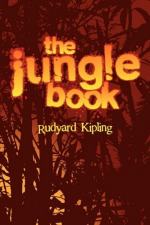After that he was taken off timber-hauling, and employed, with a few score other elephants who were trained to the business, in helping to catch wild elephants among the Garo hills. Elephants are very strictly preserved by the Indian Government. There is one whole department which does nothing else but hunt them, and catch them, and break them in, and send them up and down the country as they are needed for work.
Kala Nag stood ten fair feet at the shoulders, and his tusks had been cut off short at five feet, and bound round the ends, to prevent them splitting, with bands of copper; but he could do more with those stumps than any untrained elephant could do with the real sharpened ones. When, after weeks and weeks of cautious driving of scattered elephants across the hills, the forty or fifty wild monsters were driven into the last stockade, and the big drop gate, made of tree trunks lashed together, jarred down behind them, Kala Nag, at the word of command, would go into that flaring, trumpeting pandemonium (generally at night, when the flicker of the torches made it difficult to judge distances), and, picking out the biggest and wildest tusker of the mob, would hammer him and hustle him into quiet while the men on the backs of the other elephants roped and tied the smaller ones.
There was nothing in the way of fighting that Kala Nag, the old wise Black Snake, did not know, for he had stood up more than once in his time to the charge of the wounded tiger, and, curling up his soft trunk to be out of harm’s way, had knocked the springing brute sideways in mid-air with a quick sickle cut of his head, that he had invented all by himself; had knocked him over, and kneeled upon him with his huge knees till the life went out with a gasp and a howl, and there was only a fluffy striped thing on the ground for Kala Nag to pull by the tail.
“Yes,” said Big Toomai, his driver, the son of Black Toomai who had taken him to Abyssinia, and grandson of Toomai of the Elephants who had seen him caught, “there is nothing that the Black Snake fears except me. He has seen three generations of us feed him and groom him, and he will live to see four.”
“He is afraid of me also,” said Little Toomai, standing up to his full height of four feet, with only one rag upon him. He was ten years old, the eldest son of Big Toomai, and, according to custom, he would take his father’s place on Kala Nag’s neck when he grew up, and would handle the heavy iron ankus, the elephant goad, that had been worn smooth by his father, and his grandfather, and his great-grandfather.
He knew what he was talking of; for he had been born under Kala Nag’s shadow, had played with the end of his trunk before he could walk, had taken him down to water as soon as he could walk, and Kala Nag would no more have dreamed of disobeying his shrill little orders than he would have dreamed of killing him on that day when Big Toomai carried the little brown baby under Kala Nag’s tusks, and told him to salute his master that was to be.




